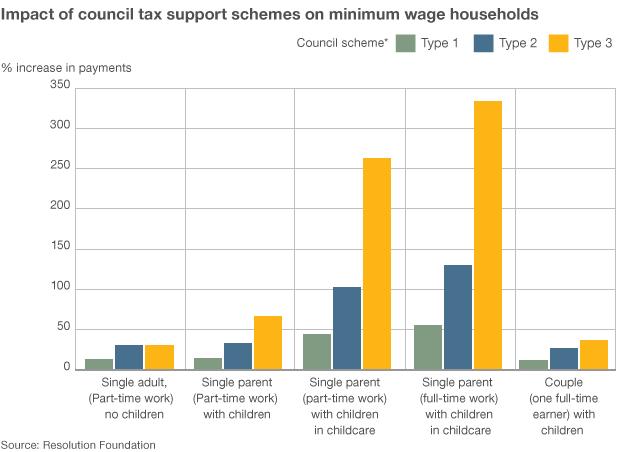'Millions of low-income households' face council tax rise
- Published
- comments
Brandon Lewis: ''The best thing for councils is to put work programmes into place to get people into jobs''
Millions of the poorest households face council tax rises because most councils in England will pass on a 10% benefit funding cut, research suggests.
A typical bill will rise from April by between £100 and £250 a year, but some could rise as much as £600, the Resolution Foundation think tank says.
Its report coincides with the deadline for local authorities to submit their plans for changing council tax benefit.
Councils say they have not been given enough freedom to manage the changes.
Responsibility for the benefit is being moved from the government to councils.
At the same time, the total spent on the benefit, which is to become known as council tax support, is being cut by 10%.
In Wales, the cut is being absorbed by the government, and not passed on to local authorities.
'Poll tax'
In Scotland, the cost is being shared between councils and the Scottish government, maintaining support for low-income residents.
But the 326 councils in England could be left with a shortfall if they intend to maintain the level of existing payments.
Some are finding savings from elsewhere in their budgets, in order to protect the incomes of the poorest households.
At least 40 local authorities have decided to maintain current levels of support. Durham County Council and Tower Hamlets are amongst those which will absorb the costs of CTS into their budgets.
The government has also put forward £100m of support for those councils that limit the council tax increase for those on benefits or low pay to 8.5%.
Ministers say the total paid out in council tax benefit doubled under the last government and welfare "reform" is vital to tackle the budget deficit.
They say the changes will give councils the incentive to help people off benefits and into work.
Council tax benefit is currently claimed by about five million households in England - about half get 100% support, meaning they currently pay no council tax at all.
But the Resolution Foundation, a not-for-profit research and policy organisation which says its goal is to improve outcomes for people on low and modest incomes, says that three-quarters of authorities in England are planning to demand a new or higher payment from the lowest income households.
This comes at a time when other benefits may also rise more slowly than the cost of living, and the government introduces an overall cap on benefits.
Because pensioners are fully protected, those of working age are, in many areas, being asked to shoulder a much greater burden.
"Millions of England's poorest households, both in and out of work, are already very close to the edge," said Gavin Kelly of the Resolution Foundation. "They are going to find it very hard to cope."
Some campaigners have likened the change to the "poll tax", in that people are asked for a contribution regardless of their ability to pay.
For Labour, shadow communities secretary Hilary Benn said: "All over the country, people on very low incomes will be asked to pay sums of money they simply cannot afford, just like the hated poll tax."
'Low priority'
Many in local government fear that councils will be left with a financial black hole, as the cost of pursuing those who do not pay through the courts could be higher than the revenue the authorities will raise from them in tax.
Sir Merrick Cockell of the Local Government Association said the lowest paid are going to be in ''a very difficult place''
Peter Fleming from the Local Government Association, which represents local authorities, told BBC Radio 5 Live the government had not given councils enough control over the scope of cuts they could pass on.
"The problem is we've been handed the cut, but not given the flexibility to design schemes... that would have actually protected the people who are most vulnerable.
"Give us the freedoms and flexibilities to actually devise the schemes that work best for the communities that we serve," he added.
He also predicted there would now "be people who are literally unable to pay" their taxes, and the "difficulty for us as local authorities is do we take people to court for very small amounts of money?"
'Right to communities'
Local Government Minister Brandon Lewis told BBC Radio 4's The World At One that the author of the report was an adviser to the Labour Party and therefore viewed the issue "through a particular lens".
He said councils had the freedom and flexibility to develop their own schemes and ministers had urged them to be "sensible" about their collection policies so "they don't spend money collecting very, very small amounts of money".
"That comes back to linking in very carefully about the point we have made about protecting the vulnerable," he said.
He urged councils to continue to try and find savings in related areas by cracking down on the £2bn in uncollected council tax and the £200m lost to fraud and error every year.
He also rejected comparisons with the poll tax, saying "we have moved on somewhat with the system since then".

Example of increase in annual payments for 'band B' house
- Published30 January 2013
- Published28 January 2013
- Published27 August 2011
- Published30 January 2013
- Published11 January 2013